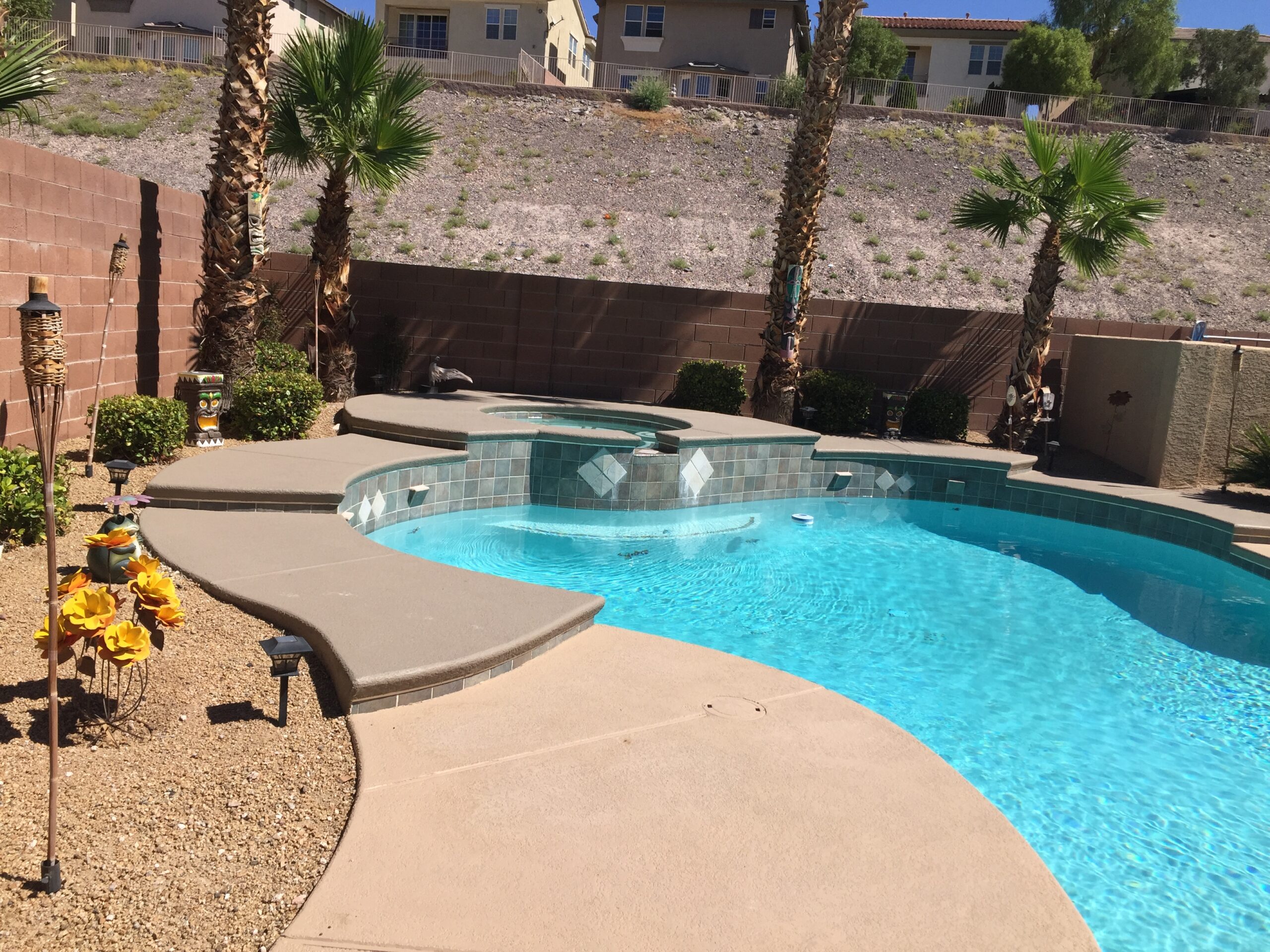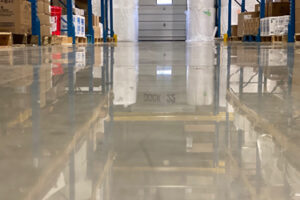A pool area is more than a simple outdoor space; it’s a place to unwind, entertain, and spend quality time under the sun. Over time, however, pool decks can become worn, cracked, or faded, diminishing the overall appeal of this oasis. Pool deck resurfacing offers an efficient way to refresh and revitalize your pool area without the need for a complete replacement. This guide explores the benefits, costs, and creative resurfacing options available to help you bring a new look to your pool deck.
What is Pool Deck Resurfacing, and Why is it Important?
Pool deck resurfacing is a restoration process that involves adding a new layer or coating to an existing pool deck to improve its appearance, durability, and safety. Unlike full replacement, resurfacing is less invasive and generally more affordable, making it an appealing choice for those who want to rejuvenate their pool deck.
Why Pool Deck Resurfacing Matters:
- Enhanced Aesthetics: Over time, weather exposure, foot traffic, and pool chemicals can fade or damage the pool deck’s surface, giving it a dull, worn look. Resurfacing revives its appearance, making the pool area more inviting and visually appealing.
- Improved Safety: Resurfacing options often include slip-resistant textures that provide added safety for areas around water. This is especially important for families with children or those using the pool deck frequently.
- Durability and Longevity: Resurfacing adds a protective layer to the deck, shielding it from UV rays, moisture, and chemical exposure. This can extend the life of the pool deck, delaying the need for a costly replacement.
- Cost-Efficiency: Pool deck resurfacing is typically more affordable than installing a new deck. It allows for a fresh look and added functionality without the expense and disruption of complete demolition and replacement.
Different Pool Deck Resurfacing Options Available
Several resurfacing options cater to different styles, budgets, and functional needs. From stamped concrete to pavers, there’s a solution for every design preference.
- Stamped Concrete Overlay
Stamped concrete overlays are a popular choice for those who desire a decorative finish with the durability of concrete. This technique involves applying a fresh layer of concrete over the existing deck and imprinting it with textures to mimic natural stone, tile, or brick. Stamped concrete is highly customizable, allowing for various patterns and colors to match your outdoor aesthetic. - Spray-Deck
Spray-deck coatings are specially formulated for high-traffic pool areas. This spray-on technique creates a textured surface that’s slip-resistant, comfortable, and cool to the touch, even under intense sunlight. It’s a practical choice for pool decks in warmer climates, as the coating helps reduce surface temperature, making it more comfortable to walk on barefoot. - Pavers and Tile Overlay
For those seeking a luxurious, upscale look, pavers or tile overlays can add sophistication and charm to any pool deck. Interlocking pavers come in various colors, shapes, and textures, providing ample design flexibility. Tile overlays, especially those using materials like travertine or porcelain, bring a polished, resort-like feel to the pool area. These overlays are durable and easy to replace in sections, though they may require a higher budget than other resurfacing options. - Epoxy Coatings
Epoxy coatings offer a smooth, seamless finish that’s both durable and low-maintenance. Resistant to chemicals and moisture, epoxy coatings are ideal for pool decks exposed to frequent splashes and pool chemicals. They are available in a wide array of colors and can be customized with metallic finishes or decorative flakes, giving the pool deck a modern, sleek appearance. - Concrete Resurfacer
For those who prefer simplicity, a concrete resurfacer is a cost-effective solution. This option involves applying a thin layer of concrete over the existing surface to smooth out imperfections, cover stains, and create a refreshed, even surface. While it doesn’t provide the decorative options of other materials, concrete resurfacers can be tinted or stained to add a subtle color enhancement.
Cost of Pool Deck Resurfacing
The cost of pool deck resurfacing varies depending on the type of material used, the size of the area, and the amount of preparation required. On average, homeowners can expect to pay between $3 and $10 per square foot for basic resurfacing options, though higher-end materials like pavers or specialty coatings can increase the price.
Factors Influencing Cost:
- Type of Material: Simple overlays like concrete resurfacers are typically the most affordable, while pavers, stamped concrete, and epoxy coatings tend to cost more.
- Surface Preparation: If the existing deck has significant damage, such as cracks or uneven areas, additional preparation is needed. This can include grinding, leveling, or filling cracks, which can add to the overall expense.
- Design Complexity: Custom designs, color applications, or intricate patterns can increase both material and labor costs. The more elaborate the design, the more time and expertise required for a flawless finish.
While the initial investment in pool deck resurfacing varies, it’s generally a more budget-friendly option than a full replacement, providing long-lasting results without the added expense.
Can I Resurface My Concrete Pool Deck, or Do I Need a Replacement?
In most cases, resurfacing is an effective way to rejuvenate a concrete pool deck, provided the underlying structure is still in good condition. Minor cracks, stains, and wear can be addressed with resurfacing materials, giving the deck a renewed appearance. However, there are circumstances where full replacement may be necessary.
When to Consider Replacement Instead of Resurfacing:
- Structural Damage: If the concrete has deep cracks, extensive chipping, or significant settling, these issues may indicate foundational problems. In such cases, resurfacing might only be a temporary fix, and a complete replacement could be a more durable solution.
- Water Drainage Issues: If water pools on the surface or the deck slopes incorrectly, simply resurfacing may not correct the problem. Poor drainage can lead to further damage over time, making replacement a better long-term option.
- Aging Concrete: Older concrete that has seen extensive wear or has weakened over time may not hold up well under new resurfacing layers. A fresh, structurally sound deck will provide a more secure foundation for the materials being applied.
For pool decks in relatively stable condition, resurfacing is an excellent choice that can breathe new life into the area while saving on costs.
Popular Pool Deck Resurfacing Ideas to Update Your Outdoor Space
Updating your pool deck with creative resurfacing ideas can elevate the overall aesthetic of your outdoor area, making it a stylish and welcoming place to relax and entertain. Here are some popular ideas to consider:
- Faux Stone or Brick Patterns
Using stamped concrete or textured overlays, you can replicate the look of natural stone, brick, or slate at a fraction of the cost. This design can add rustic charm to your pool deck, blending well with natural landscapes and garden settings. - Custom Color Stains and Dyes
Concrete stains and dyes allow you to add vibrant colors or earthy tones that complement your home’s exterior. Color customization transforms the pool deck into a more cohesive part of your outdoor living space, while also providing a fade-resistant finish. - Geometric Patterns and Borders
Adding geometric patterns or bordered sections can enhance the visual appeal of the deck and create designated zones for lounging or walking. This approach works especially well with tile or paver overlays, offering a unique, modern look. - Cool Deck Finishes
Cool deck finishes are specially designed to reduce heat absorption, keeping the surface cooler underfoot. These finishes can be applied in various colors and textures, combining comfort with style—a practical choice for areas with hot summer climates. - High-Gloss Epoxy for a Modern Look
For a contemporary, sleek appearance, consider high-gloss epoxy coatings. The reflective surface adds depth to the pool area, and when paired with metallic pigments, the epoxy can create a stunning, one-of-a-kind look that enhances any modern backyard setting.
Frequently Asked Questions (FAQs)
What is pool deck resurfacing, and why is it important?
Pool deck resurfacing is the process of adding a new layer or coating over an existing deck to restore its appearance and protect it from further damage. It’s important because it enhances aesthetics, improves safety, and prolongs the deck’s lifespan.
What are the different pool deck resurfacing options available?
Options include stamped concrete overlays, spray-deck coatings, paver and tile overlays, epoxy coatings, and concrete resurfacers, each offering unique benefits in terms of durability, appearance, and cost.
How much does it cost to resurface a pool deck?
The average cost ranges from $3 to $10 per square foot, depending on materials, deck size, and required surface preparation.
Can I resurface my concrete pool deck, or do I need a replacement?
Resurfacing is suitable for decks in relatively stable condition. However, decks with significant structural issues may need a full replacement for long-term durability.
What are some popular pool deck resurfacing ideas to update my outdoor space?
Ideas include faux stone or brick patterns, custom color stains, geometric patterns, cool deck finishes, and high-gloss epoxy coatings for a modern look.







Leave a Reply
Your email is safe with us.